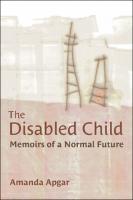The Disabled Child
External Review of Whole Manuscript
Memoirs of a Normal Future
Abstract
When children are born with disabilities or become disabled in childhood, parents often experience bewilderment: they find themselves unexpectedly in another world, without a roadmap, without community, and without narratives to make sense of their experiences. The Disabled Child: Memoirs of a Normal Future tracks the narratives that have emerged from the community of parent-memoirists who, since the 1980s, have written in resistance of their children’s exclusion from culture. Though the disabilities represented in the genre are diverse, the memoirs share a number of remarkable similarities; they are generally written by white, heterosexual, middle or upper-middle class, ablebodied parents, and they depict narratives in which the disabled child overcomes barriers to a normal childhood and adulthood. Apgar demonstrates that in the process of telling these stories, which recuperate their children as productive members of society, parental memoirists write their children into dominant cultural narratives about gender, race, and class. By reinforcing and buying into these norms, Apgar argues, “special needs” parental memoirs reinforce ableism at the same time that they’re writing against it.
Keywords
childhood, disability, special needs, parental memoir, parents of children with disabilities, care, neoliberalism, gender studies, disability studies, childhood studies, studies of memoir, queer theory, sexuality studies, crip theory, feminist disability studies, autobiography, narrative theory, medical humanities, literature and medicine, disability life-writing, feminist, queer, crip, disability justice, settler colonialism, whiteness, the good lifeDOI
10.3998/mpub.12221256ISBN
9780472075690, 9780472055692, 9780472903030Publisher
University of Michigan PressPublisher website
https://www.press.umich.edu/Publication date and place
2023Series
Corporealities: Discourses Of Disability,Classification
Society and culture: general
Disability: social aspects


 Download
Download Web Shop
Web Shop